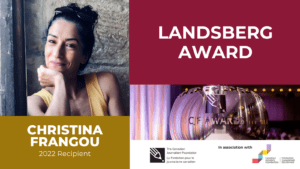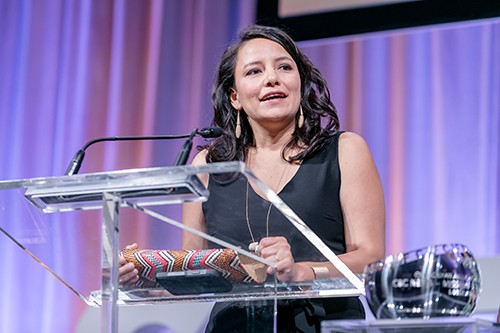Policy, Advocacy and Partnerships
With your support, we advance gender justice by advocating for policy and systemic change, building awareness, and engaging the public in taking action. We rally our community to sign advocacy letters to government representatives and take part in campaigns throughout the year. The Foundation also contributes to high-level government policy discussions and provides critical insight about gender equity to media outlets.
Want to Take Action Right Now?
Join our growing community of Signal for Help Responders, and help change the culture of stigma around gender-based violence to one of safety and support.
Together, we’re advocating for gender justice
Advocacy Initiatives
We launch engagement initiatives and reports that highlight the intersectional impacts of gender injustice, and make recommendations for how to address them.
The risk of gender-based violence has increased during the pandemic, and the necessary safety restrictions have made it harder for those in abusive situations to reach out for help. In response, the Foundation has launched the Signal for Help, a silent hand signal that can be used in a video call without leaving a digital trace. But it’s also critical that as many people as possible know how to respond and support someone who gives the Signal.
That’s why the Canadian Women’s Foundation created the Signal for Help Responder’s Action Guide. This tool helps loved ones, friends, coworkers, and neighbours recognize abuse, and helps them respond with supportive, stigma-free conversations.
When communities are under stress–from crises or disasters like pandemics, floods, wildfires or economic downturns, gender-based violence rates tend to increase. The Shockproofing Communities project emerged out of the belief that this pattern is preventable if the right conditions are put in place. Learn more
National Surveys
Through national surveys, we find out where people in Canada stand on issues of gender justice and use this data to raise public awareness and advocate for systemic change.
AT THIS STAGE OF THE PANDEMIC, SURVEY SUGGESTS CIRCUMSTANCES NOT IMPROVING FOR CAREGIVERS” (May 2022): Mothers’ health and careers continue to be disproportionately impacted
TWO THIRDS OF PARENTS ARE CONCERNED THEIR CHILDREN HAVE MISSED OPPORTUNITIES TO BUILD VITAL HEALTHY RELATIONSHIP SKILLS (August 2021): Canadian Women’s Foundation flags skills gaps during the pandemic and responds by supporting critical community programming as students head back to school.
ALMOST HALF OF MOTHERS IN CANADA ARE “REACHING THEIR BREAKING POINT” (May 2021): New data reveals that mothers in Canada are struggling under the brunt of the day-to-day decision-making and care for their children and families, including shouldering worry for their family’s mental and physical health. This has led to mothers carrying greater feelings of anxiety, isolation, anger, and sadness than fathers, with nearly half (46 per cent) saying they are reaching their breaking point.
ALMOST A QUARTER OF PEOPLE IN CANADA FEEL GENDER-BASED VIOLENCE IS “NONE OF MY BUSINESS” (March 2022): New survey also shows gap between desire to end violence and ability to support victims
FEW ARE WELL-PREPARED TO SUPPORT SOMEONE FACING GENDER-BASED VIOLENCE (November 2021): Canadian Women’s Foundation flags low public confidence in knowing what to say and do, but texting SIGNAL to 540-540 will help people feel more prepared.
SURVEY FINDS DROP IN CANADIANS’ UNDERSTANDING OF CONSENT: A 2018 study from the Canadian Women’s Foundation has found that Canadians’ understanding of consent decreased over the last three years, with only 28 per cent of Canadians fully understanding what it means to give consent, compared with 33 per cent in 2015.
March 2020
This report highlights how gender-based inequalities play out differently for different segments of the population. It is based on an opinion survey the Foundation commissioned in early 2020.
In the News
It’s important to keep issues of gender justice in the spotlight and call on stakeholders to play a role in change. Here’s a selection of recent Op/Eds, articles, and presentations:
The Hill Times: The State of Gender Justice
The Hill Times: In 2021, Motherhood is Breaking Us
The Walrus Talks: What’s Next? The Five Cs and the Care Economy
CTV News Calgary: Federal government tightens gun regulations
BBC News: TikTok: Missing girl found after using viral call for help sign
CTV News: I don’t deserve this: Amber Heard responds to online hate
105.9 The Region (York Region, Ontario radio station & online podcast), What She Said podcast: The federal budget through a feminist lens
Financial Post: What to do about women’s retirement income gap?
Globe and Mail: Women typically get less staff and less funding, but these negotiation tactics can help
Policy Briefs
Our policy team regularly submits briefs and recommendations to government, bringing an intersectional gender lens to decision-making processes.
Criminalizing Coercive Control: Unintended Consequences and Alternative Approaches
Canadian Women’s Foundation Submission in Advance of the 2021 Federal Budget
Submission for consultation on handguns and assault weapons, November 18, 2018
Bill C-78: An Act to amend the Divorce Act, the Family Orders and Agreements Enforcement Assistance Act and the Garnishment, Attachment and Pension Diversion Act and to make consequential amendments to another Act, November 16, 2018
Submission for consultations in advance of the 2019 Budget
Gun Control and Violence Prevention, May, 2018
National Housing Strategy: A Rights-Based Approach to Women and Housing, May, 2018
Submission to the House of Commons Standing Committee on Justice and Human Rights, May 2019
Brief to the House of Commons Standing Committee on Justice and Human Rights
Brief to the Standing Committee on the Status of Women, October 2016.
Canadian Women’s Foundation Submission to Pre-Budget Consultations 2024
Canadian Women’s Foundation Submission in Advance of the 2023 Federal Budget.
Canadian Women’s Foundation Submission in Advance of the 2022 Federal Budget.
Submission to the Employment Equity Act Framework Review, June 2022
Canadian Women’s Foundation Submission in Advance of the 2021 Federal Budget.
Recovery through Equality: Developing an Inclusive Action Plan for Women in the Economy.
Stimulating Gender Equality: A GBA+ Approach to Economic Recovery, September 2020.
Gendered Impacts of COVID-19, April 2020.
Written Submission to the Status of Women Canada, March 2017.
Brief for the Standing Committee on the Status of Women (FEWO) for its study on the Mental Health of Women & Girls in Canada, November 2022.
Written Statement on Quebec’s Bill 21, An Act Respecting the Laicity of the State, May 2019.
Urgent Action Needed to Ensure Indigenous Women Are Not Sterilized Without Their Consent, December 10, 2018
In an era of multiple and simultaneous crises, it is essential that Canada’s disaster and emergency management strategies, at all levels of government, account for the needs of those most who stand to be most adversely affected. Current disaster and emergency management strategies in Canada do not adequately account for the needs and predictable outcomes for women and gender diverse people, particularly those who experience multiple and intersecting forms of discrimination.
Partnerships
There is strength in collective action, so the Foundation partners with various organizations on projects that promote gender justice, inclusion and decolonization.
Gender Equality Network Canada
In 2017, Status of Women Canada selected the Canadian Women’s Foundation to convene, facilitate and oversee the Gender Equality Network Canada. Over three years, this Network of about 150 women leaders from across the country created an action plan to advance gender equality in Canada.
Learn more and read the Discussion Document for a Pan-Canadian Strategy to Advance Gender Equality.
Affordable child care is essential to achieving gender equality. That’s why we’ve joined organizations endorsing Child Care Now’s smart and sensible Affordable Child Care for All Plan. It’s the road map Canada needs to universal, quality child care. For women, access to quality, inclusive, affordable child care increases access to employment and enhances economic security. Child care can help move women out of violence and poverty and into security and independence. The Plan focuses on building a system with affordable parent fees, public expansion, and a skilled workforce delivering quality care. Learn more about Child Care Now and the Affordable Child Care for All Plan.
In 2017, the RBC Foundation brought Canadian Women’s Foundation, Catalyst Canada, Plan International Canada, and YWCA Canada together to explore common interests. The In Good Company (IGC) collaborative project emerged from these discussions. The project aims to reduce the barriers women and gender diverse people face in workplace advancement, testing Diversity, Equity, and Inclusion (DEI) solutions that are practical and actionable while positively impacting the DEI field in Canada. Learn more.
In 2019, the Foundation also collaborated with Aftermetoo and Aboriginal Peoples Television Network to address workplace sexual harassment through tools, resources, and training for federally regulated employees and employers — all housed in a one-stop online platform called Rosa. The project, called Roadmap to Future Workplaces, is supported in part by the Government of Canada.
This is a first-in-Canada program that provides startups led by Black entrepreneurs with:
- Startup network support and additional programming
- Access to Black mentors and experts
- Access to events, industry, capital and alumni networks
- Access to affordable housing and meeting spaces
The Foundation is proud to be supporting women entrepreneurs through the Fellowship, and providing leadership and personal development training. More information and how to apply to the Black Innovation Fellowship.
The award is named after Michele Landsberg—award-winning Canadian journalist, author, social activist, and feminist—to acknowledge the tremendous impact that she has had as an advocate and role model for all women in Canada. We hope the award will inspire relentless, fearless journalists to consider Canadian news from a women’s equality perspective.
Learn more about The Landsberg Award.
2023 Award
Journalists Molly Hayes, Tavia Grant and Elizabeth Renzetti won for their work on a Globe and Mail series on intimate partner violence, which spotlighted coercive control. They also asked survivors what Canada should do to address intimate partner violence. Renzetti and Grant are past Landsberg Award winners.

2022 Award
Freelance journalist Christina Frangou won for stories revealing discrimination in Canada’s medical and legal systems that were featured in various magazines:

- The Story Of The Alberta Woman Who Got 18 Years For Killing Her Abusive Husband, Chatelaine
- The Only Woman in the Room, Toronto Life
- Women’s Health Collective in Canada is Addressing the Gap in Women’s Health, Reader’s Digest
2021 Award
Toronto Star journalists Alyshah Hasham and Wendy Gillis won for their work on several submissions:


- ‘This is going to end badly’: How a 22-year history of domestic violence led to the murder of Victoria Selby-Readman
- Are women’s police stations a solution to gender-based violence in Canada?
- Six years. More than $150,000 in legal fees. She stood up to sexual harassment inside Toronto police, and won — but at what cost?
2020 Award
Columnist and feature writer Elizabeth Renzetti won for her writing in the Globe & Mail on various gender-related topics:
Violent misogyny is a threat to half our population. We need to call it what it is: Terrorism
Why has Canada had so few female first ministers?
Even in space, women can’t escape the flaws of biased design

2019 Award
Journalist Connie Walker received the 2019 Landsberg Award for CBC News: Missing & Murdered: Finding Cleo.



